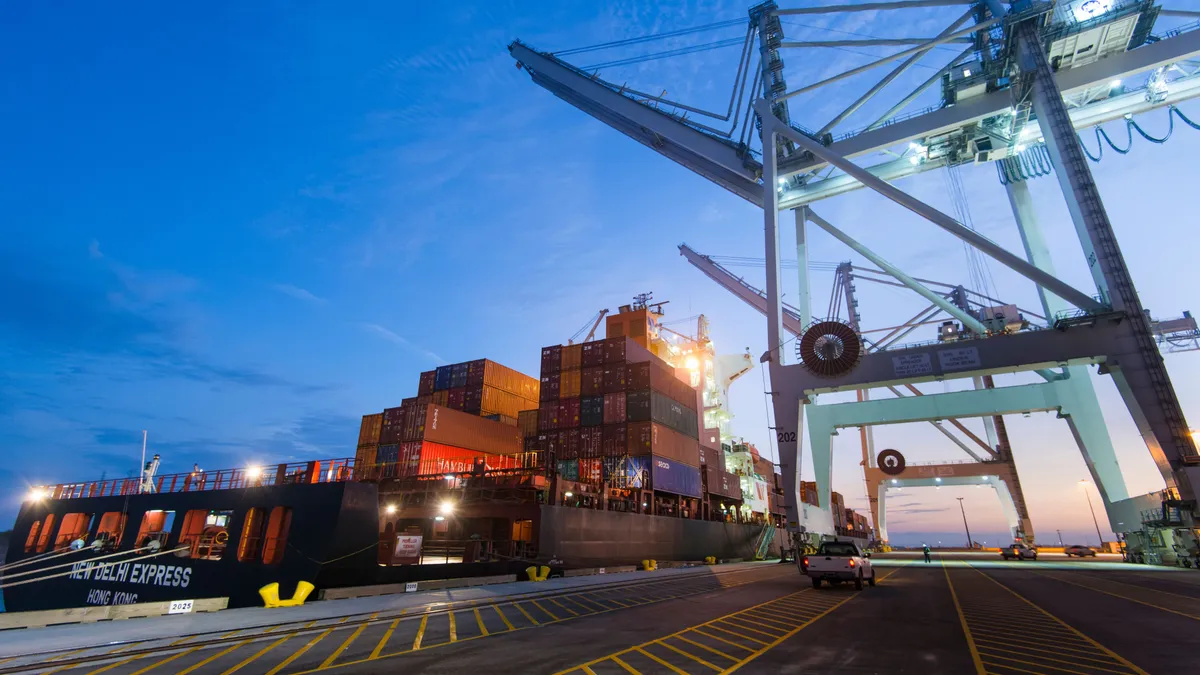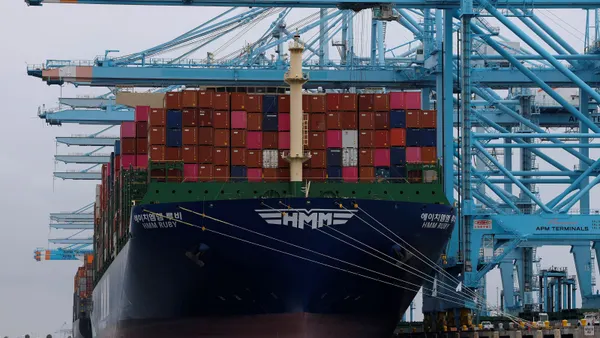Several ocean carriers may implement surcharges ahead of a possible strike or work stoppage at East and Gulf Coast ports.
The International Longshoremen’s Association may strike if its master contract with the United States Maritime Alliance is not renewed by Jan. 15. However, negotiations hit a halt in November due to automation disagreements, but are set to resume this week.
If no agreement is reached, several terminals in the East and Gulf Coast will cease operations, limiting the amount of processed cargo.
“Paralyzing these critical global commerce gateways will lead to shipment delays, increased costs, and potential supply shortages that could impact multiple sectors of the economy. And the longer a work stoppage goes on, the more consumers will feel the ripple effects,” the Retail Industry Leaders Association said in a Jan. 6 press release.
Here’s a list of anticipated surcharges from major carriers, should a strike occur.
MSC
Mediterranean Shipping Company’s Emergency Operation Surcharge is $1,000 per TEU and $2,000 per forty-foot equivalent unit, according to a Dec. 26 customer advisory.
The charge will become effective Jan. 25 and covers trades from Canada, Mexico, Bahamas and South Africa to the East and Gulf Coast.
The EOS is set to cover expected operational disruptions at U.S. ports as a consequence to work stoppages, strikes or other labor-related reasons, MSC said in the advisory.
CMA CGM
In October, CMA CGM announced a local port charge from the East and Gulf Coast ports to all destinations. The charge also covers all origins shipping to the East and Gulf Coast ports.
The carrier also postponed its Peak Season Surcharge from Jan. 1 to Jan. 15. The surcharge applies to shipments from the Indian Subcontinent, Middle East Gulf, Red Sea & Egypt to the East and Gulf Coast.
Hapag-Lloyd
Hapag-Lloyd announced plans to implement a Work Disruption Surcharge and a Work Interruption Destination Surcharge, effective Jan. 20, according a Dec. 26 announcement.
The WDS is set to be $850 per twenty-foot equivalent and $1,700 per forty-equivalent equipment for imports from all ports in North Europe, the Mediterranean, Africa, the Middle East, the Indian Subcontinent, Oceania and Latin America to the U.S. East Coast and Gulf ports.
The WID surcharge will also be $850 per twenty-foot equivalent and $1,700 per forty-equivalent equipment, covering imports from all ports in East Asia, such as Japan, Taiwan, Hong Kong, China, Vietnam, Singapore, among others, to the U.S. East Coast and Gulf ports.
Hapag-Lloyd’s fees intend to cover additional costs from labor disruptions, strikes, slowdowns, unrest, congestion and other events that may delay operations, the carrier said.
WDS and WID will be waived if no disruptions take place. “It will not apply to containers already on the water or gated in before Jan. 20, 2025, and will only affect cargo gated in on or after this date,” according to the announcement.
ZIM
ZIM Integrated Shipping will apply an ILA Strike Surcharge for all cargo moving to or from East Coast and Gulf ports, effective Jan.10, according to a customer advisory.
The fee will be $1,000 per twenty-foot equivalent and $2,000 per forty-foot equivalent for all cargo going to and from the East and Gulf Coast ports, contingent on a strike.
“This surcharge is applied as a result of the additional costs and expenses to ZIM caused by a strike, work stoppage, work slowdown or other labor-related disruptions to operations at US East Coast and US Gulf ports and the potential congestions due to such disruption,” the carrier said.
Maersk
“At this point, Maersk has not implemented a surcharge related to a potential strike. We will continue to keep our customers informed as this dynamic situation continues,” a Maersk spokesperson told Supply Chain Dive in an email.
During the ILA’s 3-day strike in October 2024, the carrier did plan to implement a local Port Disruption Surcharge to mitigate labor-related service impacts.
Maersk did encourage its customers to pick up their laden containers and return empty containers at U.S. East and Gulf Coast ports before January 15, in a December advisory.
“Our teams are actively developing contingency plans to minimize the impact should a labor disruption occur. We are committed to keeping you informed and will share any updates or new developments as they arise,” the carrier said in the advisory.
ONE
Ocean Network Express advised its customers of cargo handling measures if a strike takes place.
“If a disruption occurs, all U.S. East Coast and Gulf Coast export bookings for sailings after January 15, 2025 will be impacted. Booking adjustments, including rolls to other vessels and cancellations, may be needed,” ONE said in a Jan. 3 advisory.
New export bookings of refrigerated and dangerous goods are paused for vessels that plan to depart on or after Jan. 8.
ONE is encouraging shippers to pick up import cargo by Jan. 15 and advises that live reefer containers are potentially at risk during port disruptions.












